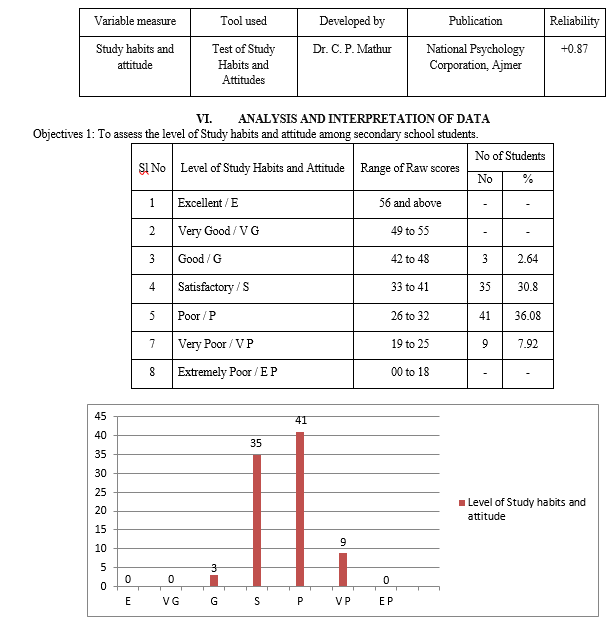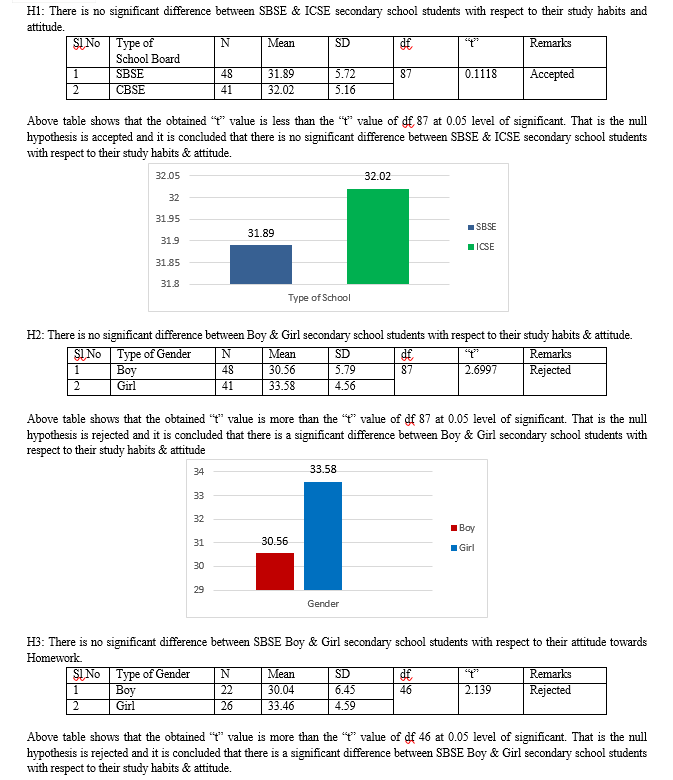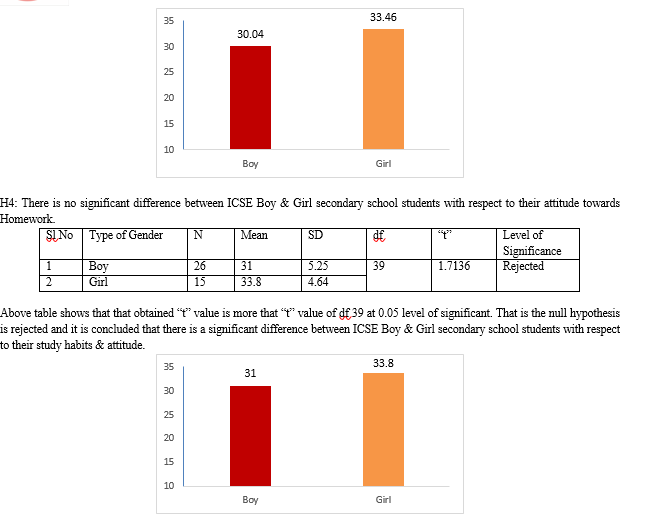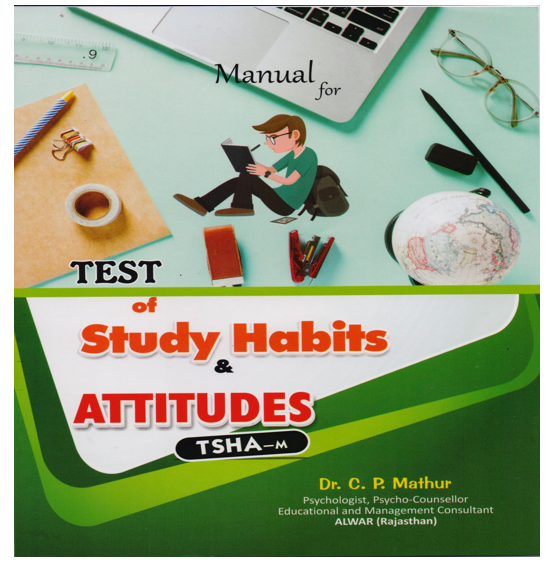Ijraset Journal For Research in Applied Science and Engineering Technology
- Home / Ijraset
- On This Page
- Abstract
- Introduction
- References
- Copyright
A Study-on-Study Habits and Attitudes Among Secondary School Students
Authors: Sharath Kumar C R
DOI Link: https://doi.org/10.22214/ijraset.2023.51577
Certificate: View Certificate
Abstract
Smart way of learning has to be the key to academic success for learners. This “Smart way” can be developed into strategies by studying the study habits and attitude of the student towards learning. Studying the study habits and attitude of students is of optimum importance to teachers, learners and caregivers, so as to promote and aid in the learning process of the students. Rote learning has been encouraged over time but there is a need of change in strategy of studying to meet the needs of the current competitive world. The main aim of this study is to determine the extent of study habitual patterns and a learner’s attitude studying in general as a single variable holistically. There was no significant difference found in the study habits of SBSE and ICSE secondary school students as well as any difference in the two genders study patterns. On an average it was found that the majority of the students in both the education systems had a poor study habit. This paper attempts at giving plausible solutions to improve the students study habits and attitudes. Here the researcher has used survey method and Test of Study Habits and Attitudes tool prepared and standardized by Dr. C.P. Mathur to collect data.
Introduction
I. INTRODUCTION
Education is the basic birth right of every individual. To be educated through formal education has become very easily accessible to the common man. The Indian education system dates back to the Vedic periods where it was restricted to a collective group of the community and women rarely received the necessary education. Which was unfair but man has grown from that point and today education is the fundamental right of every citizen of the country. The Right to Education Act of 2009 carries the essence that - every child has an access to free and compulsory basic education from the age of 6 to 14 years. This in itself carries the message brought out by the Basic Education or Nai Talim of the Father of Nation Mahatma Gandhi. Again in the current situation the same is being resembled in the NEP 2020.
The minimal education to be attained by an individual has always been profoundly highlighted by many educationists throughout history. Secondary schools form the major portion of this minimal education to be received. Each student must cross this educational milestone and then move forward to their subject of choice. Hence secondary school education creates the basic foundation for the future professionals in various fields. Subjects taught in this level have a significant impact on what students choose as their future subject of choice.
According to Jato (2014) Study habit is an action such as reading, taking notes, holding study groups which the students perform regularly and habitually in order to accomplish the task of learning. Study habits can be described as effective or ineffective depending upon whether or not they serve the students well. The basis for the development of a good study habit is influenced by a lot of external factors (home environment and school environment) and internal factors (attitude towards education, attitude towards teachers, mental conflicts, concentration, self-confidence etc.)of a learner.
Attitude is a term borrowed from psychology. An “attitude” is a hypothetical construct that represents the degree to which an individual likes or dislikes something. Everything, i.e., any person, place, thing, or event, can be the object of an attitude. People can be in conflict with or ambivalent toward an object if they simultaneously possess positive and negative attitudes toward it.
Even though study habits and attitude seem as vague concepts they can be studied together to form a connection and pattern within them to help students build efficiently. It is necessary to understand that the word Study is not synonymous to learning, rather, learning is something achieved through studying. Studying is how much time one contributes to acquire necessary information.
The theme of the study to be conducted revolves around providing a plausible and working way of study habit and solution to teachers on how to improve a student’s attitude towards any subject. And also study the same on how it differs between boys and girls and also in urban and rural areas. The study might present itself to be a mini guide for teachers.
II. SIGNIFICANCE OF THE STUDY
There are all kinds of students in a classroom scenario. Students who do not even need a teacher to study are also present as well as students who need consistent guidance from the teacher as well. Teachers must be aware of the student attitude towards them and the subject being taught by them. The main work of the teacher has to be to facilitate the students' educational needs. This includes their likeness towards a subject and understanding if they do not like any subject and why they don't like it.
Study habits are a combination of two words ‘Study’ and ‘Habits’. When taking it separately, study means, ‘Application of the mind to the acquirement of knowledge’ (M Agarwal & Dr. A K Teotia 2015). Study habits and attitude majorly impact the academic attainment of students, especially at the secondary education level. Hence a study of it is very much necessary as the main focus is on academic achievement. There is a consistent growth in quantitative improvement of students in secondary level but the question that arises is how efficiently these students have attained the learning level of that age. This study will be helpful to assess the student's efficacy depending on their study habits and attitude. In the current trend there is a much needed emphasis on developing the affective domain and creative domain of students since there is a depletion in students who indigenously create or invent. Hence this study is important to develop an understanding of the students. It is expected to provide an inferential solution from the results that shall be obtained to more efficient study methods. Attitude modification in students is only brought about by means of punishments whether corporal or non-corporal. Where in corporal punishment must be avoided at all costs. This study aims to provide functioning reasonable solutions to adoption of unique ways to bring modification in attitude towards prejudices towards subjects and teachers. There is a necessity to understand the interrelation between the study habits and attitudes of students towards study patterns. If there is a relationship then how can this relation help each other in a complimenting way and in turn help students in self-improvement. It is important to build a proper study pattern that is flexible to the students so that it becomes helpful for them at higher education. This will come through understanding their study patterns. They can arrive at this understanding through answering the questionnaire of the study. This is just one way to arrive at it. Hence this is the researcher’s hopeful attempt; that students, to which the test will be conducted, might be able to self-reflect on their study patterns. Having a modified attitude and improved and well-functioning study habits shall prove to be useful for students for their higher education. Hence the results of the study might help teachers and parents collectively support and guide their wards. Since there are far less studies in this field, especially in the region chosen to conduct the survey, this might help the primordial secondary school population of the urban and surrounding rural area to adopt and adapt to better study habits.
III. REVIEW OF RELATED LITERATURE
- Abdulkareem Munir (2022); This study investigated the relationship between students’ study habits and academic performance in biology among secondary schools in Katsina metropolis. This study adopted descriptive correlation survey research design. The study revealed that there is significant relationship between the students’ study habits and academic performance in biology among secondary schools in Katsina metropolis. Based on this study it’s recommended that the parents should be enlightened on the importance of their involvement on improvement of their children study habit toward their academic performance.
- Sarbjotkaur (2021); this study focused on the study habits and attitude of 10th class students. There exist no significant differences in the mean score of study and attitude in C.B.S.E. and P.S.E.B. students. Mean score did not show any significant difference in study of habits and attitude of class 10th in C.B.S.E. and P.S.E.B. with respect to male and female students.
- Muhammad L Sufiyanu H J (2021); The study investigated the impact of study attitude, study habit and students confidence on academic performance of students in business mathematics. The researchers concluded that study attitude study habit and students confidence have significant impact on academic performance of students.
- Tawheed Lateef Rather & Ishfaq Ahmad Bhat (2020) concluded from their study that having good study habits are important and contribute significantly in the academic achievement of students. For achieving goals more easily and efficiently developing good study habits is important. It is very important to give proper guidance to students in order to develop efficient study habits which help students to study smarter and faster.
- Aysel Demiro?lu Memis & H?lya Kandemir (2019) in their work “The relationship between the study habits and attitudes and metacognitive reading comprehension self-awareness, reading comprehension, reading attitudes” aiming to analyze the correlation between the said variables draw that there is a positive moderate and significant relationship between the considered variables. This impacts the course achievements in the Turkish education system.
- Geetanjali S Satyarthi (2018) says there is positive relationship between academic achievement and study habits of secondary school students. There is significant relationship in academic achievement of secondary school students having good and poor study habits. There is no significant difference between academic achievement and study habits of secondary school students in terms of gender.
- Madhvi Agrawal & Dr. Anil Kuar Teotia (2015) have studies the relations of study habits and attitude towards in education in relation to gender, area of school and type of the school of secondary level students. The study made it clear that non-significant difference was observed in the attitude towards education of the secondary level students with regards to gender and area of schools.
- Evans Atsiaya Siahi & Julius K Maiyo (2015) in their Research paper sought the relationship between study habits and academic achievement of students. Even though schools impart uniform instructions to all students, wide range of difference is observed in their academic achievement of students. The results of the paper concluded that to pre-empt failure and to improve standards, schools from the elementary should provide relevant values and stimulating academic environments. Students should not be condemned but be encouraged and linked to teachers with whom they can establish reflective intellectual companionship that will help improve study habits.
- Sekhar and Karanam (2014) conducted a study on Study habits of viii class students and their academic achievement. Education has become the principal avenue of opportunity for academic achievement and it is the educational system that identifies the most capable young buds and prepares them to blossom in the society. The learner's greatest resources are their intellectual gifts, superior capacity for learning, reasoning and imagining. To master these facets of intellectual dimensions a child needs to develop and use the capacities effectively through study habits. Practically a child strives to think and feel in the general role of learning and it is influenced by his past learning. What a child is capable of learning is always limited by what he already knows. The basic motivation for learning is the normal tendency to explore and make sense of the environment. A successful teacher is the one who manages to relate study habits in the learning environment. The child needs to perceive the information in a meaningful manner and interpret the new material within his competence. There is a need to realize the learning potential in all the subjects. Efficient learning is related to home, social and emotional maturity of the child. The major characteristics that influence the learner's study habits are the clarity of the subject matter, skill in learning process, using the available resources and establishing a study routine.
- Unal (2014) conducted a study on Analyzing the Effect of Learning Styles and Study Habits of Distance Learners on Learning Performances: A Case of an Introductory Programming Course. This study examined the relationships among learning styles, study habits, and learning performances in an online programming language course. Sixty-two sophomore students who enrolled in an online introductory programming course participated in the study. Kolb’s Learning Style Inventory (LSI) was used to measure the students’ learning styles. Another inventory developed by the researcher was used to determine learners’ study habits. An achievement test was used to put forward their learning performances. As a result, significant relationships between learning styles, study habits, and learning performances were revealed. The results present some ideas about distance learners’ learning styles and study habits for instructors who wish to incorporate synchronous courses and support learners.
- Fakeye & Temitayo (2013) conducted a study on Classroom Participation and Study Habit as Predictors of Achievement in Literature-in-English. This study attempted to investigate the extent to which classroom participation and study habits predicted students’ academic achievement in Literature-in-English in selected senior secondary schools in Ibadan North Local Government Area of Oyo State. The study adopted descriptive research design of ex-post facto type. The sample comprised 500 senior secondary school two students from ten selected secondary schools in Ibadan North Local Government Area of Oyo State. The results revealed that there was a significant relationship between classroom participation and students’ achievement in Literature in English; there was no significant relationship between study habits and students’ achievement in Literature in English. There was a significant relative contribution of classroom significant relative contribution of study habits on students’ achievement in Literature in classroom participation.
- Chaudhari (2013) in their study intended to explore the study habits of higher secondary school students in relation to their academic achievement in the Banaskantha District of Gujarat. The objectives of the study was to study the relationship between study habits and academic achievement of higher secondary school students and to study the significant difference between high and low academic achievement students on study habits. The sample of the study was selected through simple random sampling technique. The sample consisted of 80 higher secondary school students. The results of the study revealed that there is a significant positive correlation between study habits and academic achievement of higher secondary school students as whole and dimension wise. Further, there is a significant difference between high and low academic achievement students on study habits in general.
- Oluwatimilehin & Owoyele (2012) investigated the relationship between study habits and students’ academic achievement in core subjects at the junior secondary school level. The aim of the study was to determine the relationship between various aspects of study habits including homework and assignments, time allocation, reading and note-taking, study period procedures, concentration, written work, examination and teacher consultation and students’ achievement in English language, mathematics, integrated science and art. A total of 300 students participated in the study. Findings revealed that of all the study habits subscales, ‘teacher consultation’ was most influential while the time allocation exercise, concentration, note-taking reading and assignments were regarded as less integral to students’ academic performances.
- Parua & Archana (2011) studied the study habits of secondary school students in relation to their scholastic achievement. This study intended to explore the study habit of secondary school students in relation to their scholastic achievement in the Yamuna Nagar district of Haryana. The objectives of present study was to study the relationship between study habits and scholastic achievement of secondary school students and to study the significant difference between high and low scholastic achievement students on study habits. The sample of the study was selected through simple random sampling technique. The sample consisted of 100 secondary school students. The results of the study revealed that there is a significant positive correlation between study habits and scholastic achievement of secondary school students as whole and dimension wise. Further, there is a significant difference between high and low scholastic achievement students on study habits in general.
- Aanu & Olatoye (2011) studied the Use of Library Resources, Study Habit and Science Achievement of Junior Secondary School Students. This study investigated combined and relative influences of use of library resources and study habits on science achievement of the junior secondary school students in Ogun State, Nigeria. Three hundred and sixty (360) students randomly selected from twelve secondary schools in Ogun State participated in the study. Three instruments were designed and used for data collection. Use of library resources and study habits combined together to significantly influence science achievement. There is no significant difference between male and female students’ use of library resources, study habits and science achievement. The school counselors should train students on effective study techniques in order to foster science achievement.
- Marcus Crede & Nathan Kuncel (2008) speak about Study habit, skill, and attitude inventories and constructs were found to rival standardized tests and previous grades as predictors of academic performance, yielding substantial incremental validity in predicting academic performance.
- Hussain (2006) studied the “Effect of Guidance Services on Study Attitudes, Study Habits and Academic Achievement of Secondary School Students”. The substantive aim of the study was to examine the effect of guidance services on students’ study attitudes, study habits and academic achievement. An experimental study was devised for the purpose. A guidance program for secondary school students was developed by the researcher. An experiment was conducted to explore the effectiveness of guidance services in terms of improvement in students’ study attitudes, study habits and academic achievement. Ten null hypotheses were tested to explore the effect of guidance services on students’ study habits, study attitudes and academic achievement in five subjects. The results of the study indicated that the guidance services have a significant effect on the students’ study attitude, study habits and academic achievement. The findings of present study as well as other studies conducted in this area reveal that guidance services are effective for the improvement of school instruction. Therefore, it is recommended that centers for guidance services or guidance clinics may be established in each school.
- Thakkar (2003) studied academic achievement, adjustment and study habits of rural and urban students. The sample consisted of 200 students of standard IX from rural and urban localities. Tools used were, Adjustment Inventory by M. N. Palsana; Study Habit Inventory by M. N. Palsana and academic achievement score on the basis of their two unit tests, semester/terminals and final examinations. Correlation and t-test technique was used for data analysis. Major findings of the study were: (1) There was no significant relationship in academic achievements and study habits for rural and urban students (2) With regard to adjustment in the areas of home and family, personal, emotional and total adjustment, there was a positive significant difference between rural and urban students. However, in the areas of social and educational adjustment, this difference was not significant.
- Ngailiankim (1988) investigated the attitude and study habits related to achievement in mathematics of class IX in Shillong. The study attempts to find out the attitude of the students towards mathematics and study habits of the students and their relationship with achievement in mathematics. No significant difference was found in the attitude towards mathematics of students grouped high, average and low in mathematics achievement. No significant differences were found in the study habits scores of high, average and low achievers in mathematics.
- Robert B. Burns & Clifford B. Dobson (1984) speak about there being a general agreement among teachers that study habits and attitudes are likely to exert considerable influence on the academic performance of their students.
IV. STATEMENT OF THE PROBLEM
“A study on study habits and attitudes among secondary school students.”
A. Objectives Of The Study
- To study significant differences in study habits and attitudes between girls and boys in secondary school.
- To study significant differences in study habits and attitudes between SBSE and ICSE students of secondary school.
- To assess the level of study habits and attitude among secondary school students.
B. Hypothesis Of The Study
- There are no significant differences in study habits and attitudes between girls and boys in secondary school.
- There are no significant differences in study habits and attitudes between SBSE and ICSE students of secondary school.
C. Variables Of The Study
Main variables:
- Study habits
- Attitude
Background variables:
- Girls
- Boys
- SBSE
- ICSE
D. Operational Definitions Of The Key Terms
- Study Habits: Study habit is the pattern of behavior adopted by students in the pursuit of their studies that serves as the vehicle of learning. This includes completion of homework on time, studying notes with understanding, not cramming information, working through homework without help, prepare for examinations on time, extra studying, memory training, review work, planned studying time etc.
- Attitude: A student’s response towards the specific act of studying. This combines attitude towards education and attitude towards teachers. The student has to set personal goals and objectives towards the education being received and have a positive attitude towards the subject and the teacher who teaches it.
- Secondary School: School educating students between the age of 11-15 years of age. That is from class 6th to class 10th.
- Secondary School Students: Students studying secondary school of Mysore district.(In the present study the researcher has considered only 8th and 9th standard students)
- SBSE: State Board of Secondary Education. This body is known as Karnataka state Secondary Education Examination Board (KSEEB). Governing the Examinations for the secondary level exams and much more.
- ICSE: Indian Certificate of Secondary Education. This is an exam conducted by the Council for the Indian School Certificate Examinations (CISCE).
V. METHODOLOGY OF THE STUDY
The Descriptive cum Survey method will be used to study the “A study on study habits and attitudes among secondary school students”.
A. Sample Of The Study
The students studying in different types of high school affiliated to the Karnataka state secondary education department become the total population of the study.
B. Tool Used For The Study
The researcher will be using the standardised tool “Test of Study Habits and Attitudes by Dr. C.P. Mathur (English)”. The test is based on nine major areas of the study techniques, habits and attitudes – attitude towards teachers, home environment, and attitude towards education, study habits, mental conflict, concentration, home assignment, self-confidence and examination. The test contains 60 items that have been distributed in the areas mentioned. The items seek “YES”, “DOUBTFUL” and “NO” responses. The test is non-time. A high score on this test indicates high order of correct study habits and proper attitudes, while a low score shows poor study techniques.



VII. MAJOR FINDINGS OF THE STUDY
The purpose of the current study was to come up with solutions for any drawbacks in students study habits and attitudes if any in a comparison between the ICSE and SBSE and the Girls and Boys of the secondary schools respectively. For the support to this purpose following were the findings of the survey conducted:
- In the totality of the survey majority of students were found to have a poor study habit and attitude which constitutes about 36.08% of the samples. Only about 2.64% had a good study habit and attitude. 7.92% of the students had very poor study habit and attitude.
- There were no students who lie in the extremities of study habits and attitudes, i.e., in the range of excellent and extremely poor.
- In the comparison between SBSE and ICSE secondary school students there isn’t any significant difference in their study habits and attitude.
- There is no significant difference in study habits and attitude between the boys and girls of the total samples collected.
- There is no significant difference in the study habits and attitude of boys and girls in SBSE schools.
There is no significant difference in the study habits and attitude of boys and girls in ICSE schools.
A. Limitations Of The Study
- This study is limited to secondary school learners.
- This study is limited to the Mysore district.
- This study is conducted only for ICSE and SBSE students.
B. Educational Implications
The results interpreted from the data can be derived to help three major supporting factors to students study environment – Learners internal motivation, teachers and parents. The students who have average to poor study habits can be made to go through counseling and mentoring programs to find the root cause of the lack of internal motivation and help them overcome their obstacles internally. It can support parents help create a better study environment at home for the learners to meet their learning needs.
It is of higher value to teachers which can help teachers improve their teaching. The study can be of service to teachers to try and experiment with new methods and techniques in teaching. This assists in stimulating a positive attitude in learners towards building better study habits. Teachers can act as better facilitators and tend to the needs to the learners. This can be a huge step in promoting self-studying habits among learner. An active teacher gravitates towards achieving the objectives of education effectively and successfully. Students can develop their own better study strategies for academic success.
C. Suggestions For The Future Study
- This study can be conducted for students and even adults from the age of 13 to 16 and above.
- The study can be conducted to individuals residing in any and many parts of the world.
- The study can be extended to SBSE, CBSE and ICSE individually and altogether.
- The number samples collected for the said survey can be as many as possible.
- The study can be used for Doctoral Research and Post-Doctoral Research as well.

References
[1] Jato, M. (2014, October 31). Academic Journals - International Journal of Library and Information Science - study habits, use of school libraries and studentsâ€TM academic performance in selected secondary schools in ondo west local government area of ondo state. Retrieved October 20, 2022, from https://academicjournals.org/journal/IJLIS/article-full-text/10E5AEA47583 [2] Government of India; The Right Of Children To Free And Compulsory Education Act, 2009;doi: https://legislative.gov.in/sites/default/files/A2009-35_0.pdf [3] Shelke, Madhuri. (2019); December 2019 Conference: Sinhgad college of nursing; EFFECTIVE STUDY HABITS FOR LEARNERS; doi:https://www.researchgate.net/publication/338145190_EFFECTIVE_STUDY_HABITS_FOR_LEARNERS [4] Aditi Thakur; 11th August 2020; The Quint; Resemblance of Gandhi’s ‘Nai Talim’ inNEP 2020 is Unmissable (Mahatma Gandhi sought to revamp the education system through Nai Talim); doi:https://www.thequint.com/news/education/resemblance-of-mahatama-gandhis-nai-talim-in-nep-2020 [5] Holtzman, W. H., & Brown, W. F. (1968); Evaluating the study habits and attitudes of high school students. Journal of Educational Psychology, 59(6, Pt.1), 404–409. doi: https://doi.org/10.1037/h0026438 [6] Burns, R. B., & Dobson, C. B. (1984). Study habits and attitudes. SpringerLink. Retrieved October 23, 2022, from doi: https://doi.org/10.1007/978-94-011-6279-1_21 [7] Memi?, A. D. (2019, August 25). The Relationship Between the Study Habits and Attitudes and Metacognitive Reading Comprehension Self-Awareness, Reading Comprehension, Reading Attitudes | Memi? | World Journal of Education. doi: https://doi.org/10.5430/wje.v9n4p133 [8] Credé, M., & Kuncel, N. R. (2008). Study Habits, Skills, and Attitudes: The Third Pillar Supporting Collegiate Academic Performance. Perspectives on Psychological Science, 3(6), 425–453. https://doi.org/10.1111/j.1745-6924.2008.00089.x [9] Lateef Rather, T., & Ahmad Bhat, I. (2020, October). STUDY HABITS AMONG STUDENTS: AN OVERVIEW. https://www.researchgate.net/publication/363371307_Study_Habits_among_students_An_Overview [10] Atsiaya siahi, E., & K. Maiyo, J. (2015, August). Study of the relationship between study habits and academic achievement of students: A case of Spicer Higher Secondary School, India. https://files.eric.ed.gov/fulltext/EJ1077791.pdf [11] Agrawal, M., & Kumar Teotia, Dr. A. (2015, December). Study Habits and Attitude Towards Education of Secondary Level Students of Delhi. worldwidejournals.com. https://www.worldwidejournals.com/global-journal-for-research-analysis-GJRA/recent_issues_pdf/2015/December/December_2015_1453125348__97.pdf [12] Geetanjail S Satyarthi (2018, February 19). Secondary School Students of India: Needs To Improve Their Study Habits. https://www.academia.edu/35955829/Secondary_School_Students_of_India_Needs_To_Improve_Their_Study_Habits [13] Muhammad, Lawal & Sufiyanu, H. (2021). Impact of Study Attitudes, Habits and Self-Confidence on Academic Performance of Students in Business Mathematic Abstract. 13. 201 - 211. https://www.researchgate.net/publication/354527281_Impact_of_Study_Attitudes_Habits_and_Self-Confidence_on_Academic_Performance_of_Students_in_Business_Mathematic_Abstract [14] Kaur, S. (2021, February). Study habits and attitude among 10th class students with respect to gender. http://www.rspsciencehub.com/. https://rspsciencehub.com/pdf_9527_62c60bc941e83bb081f98fa407b4d8ab.html [15] Munir, A. (2022). Relationship between Students’ Study Habits and Academic Achievement in Biology among Secodary Schools in Katsina Metropolis, Nigeria. Asian Research Journal of Current Science, 4(1), 269-273. Retrieved from https://globalpresshub.com/index.php/ARJOCS/article/view/1595
Copyright
Copyright © 2023 Sharath Kumar C R. This is an open access article distributed under the Creative Commons Attribution License, which permits unrestricted use, distribution, and reproduction in any medium, provided the original work is properly cited.

Download Paper
Paper Id : IJRASET51577
Publish Date : 2023-05-04
ISSN : 2321-9653
Publisher Name : IJRASET
DOI Link : Click Here
 Submit Paper Online
Submit Paper Online

